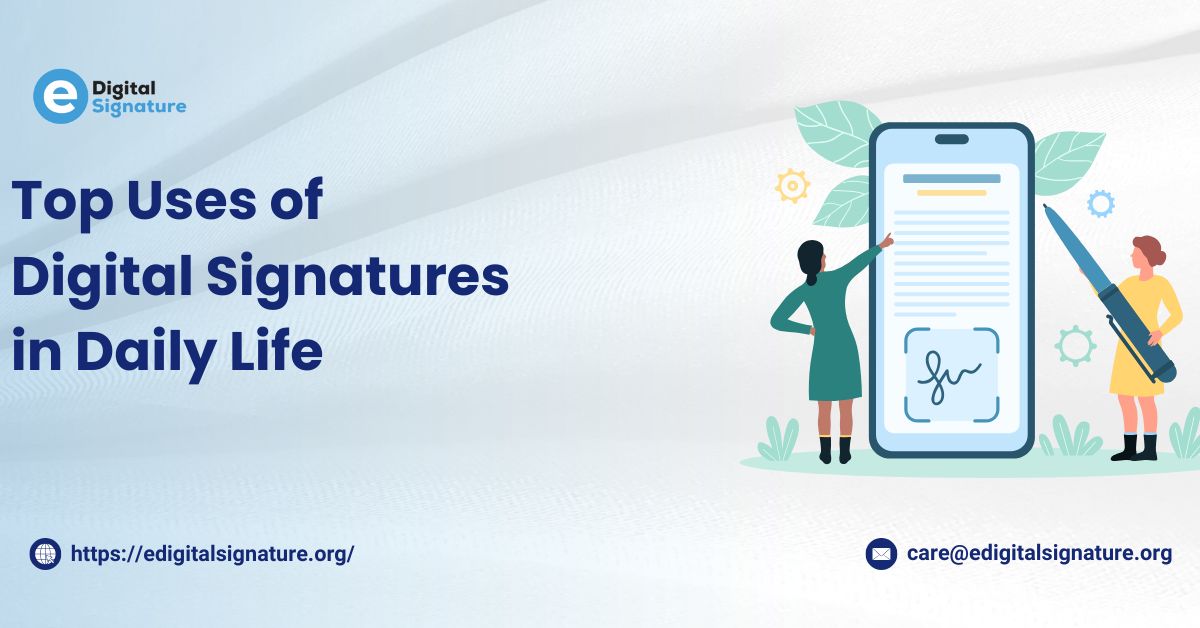Top Uses of Digital Signatures in Daily Life

In today’s digital world, transactions, agreements, and documents are increasingly being handled online. This has made digital signatures an essential tool for ensuring security, authenticity, and legality in various activities. A digital signature is an electronic form of a signature that verifies the identity of the signer and ensures that the document has not been altered.
Digital signatures are widely used in business, banking, government services, legal agreements, and everyday transactions. This article explains the top uses of digital signature in daily life, how they work, and their benefits.
What is a Digital Signature?
A digital signature is a secure electronic signature that is used to sign documents and authenticate digital transactions. It is created using cryptographic technology, ensuring that the document is protected from fraud and tampering.
How Does a Digital Signature Work?
A digital signature uses encryption technology to create a unique code that is linked to the document and the signer.
When a document is signed digitally, it generates a unique hash value that cannot be altered.
If someone tries to change the document after signing, the signature becomes invalid.
Digital signatures are legally recognized and provide security, integrity, and authenticity.
Now, let’s explore the various daily life uses of digital signatures.
How Does a Digital Signature Work?
A digital signature works through public key infrastructure (PKI), which uses a pair of keys:
Private Key – Used by the signer to digitally sign the document.
Public Key – Used by the recipient to verify the authenticity of the signature.
When a document is digitally signed, it is encrypted using the private key. The recipient uses the public key to decrypt the signature and verify that the document has not been altered.
This process ensures:
The document is authentic and has not been modified.
The signer’s identity is verified.
The signed document is legally valid.
Types of Digital Signatures
There are three main types of digital signatures:
1. Class 1 Digital Signature
Used for basic email authentication and communication.
Not valid for official legal documents.
Provides a low level of security.
2. Class 2 Digital Signature (Discontinued in India)
Used for filing income tax returns (ITR), GST, and company registrations.
Verifies the identity of the signer before approving transactions.
3. Class 3 Digital Signature
The most secure type of digital signature.
Used for e-tendering, e-procurement, online auctions, and banking transactions.
Required for businesses applying for government contracts.
Uses of Digital Signatures in Banking and Finance
A. Online Banking Transactions
Banks use digital signatures to verify online transactions and prevent fraud.
Customers sign loan agreements, fixed deposit forms, and account opening documents digitally.
Digital signatures ensure that electronic fund transfers are secure and authenticated.
B. Credit Card and Loan Applications
Many banks allow customers to apply for credit cards and loans digitally.
The use of digital signatures helps in quick approval without visiting the bank.
It ensures that customer identity is verified, reducing the risk of fraud.
C. Tax Filing and Financial Documents
Digital signatures are used for filing income tax returns (ITR) online.
Business owners use them for GST registration and tax payments.
It ensures that tax documents are legally signed and stored securely.
Uses of Digital Signatures in Government Services
A. e-Governance and Online Applications
Digital signatures are used for applying for government documents like Aadhaar, PAN, and passports.
Citizens can use digital signatures to file complaints, submit applications, and access e-services.
B. Digital Contracts and Agreements
Government agencies use digital signatures for official contracts, procurement documents, and legal agreements.
It eliminates paperwork and speeds up the approval process.
C. Business and Trade Licenses
Entrepreneurs and startups can apply for business licenses and permits using digital signatures.
Documents related to company registration, Udyam (MSME) registration, and trade licenses are signed digitally.
Uses of Digital Signatures in Legal Documents
A. Signing Contracts and Agreements
Businesses and individuals use digital signatures to sign rental agreements, employment contracts, and vendor agreements.
Legal firms accept digitally signed affidavits and court-related documents.
B. Notary and e-Witnessing
In some countries, digital signatures are used for the online notarization of documents.
Legal documents can be witnessed and verified electronically without physical meetings.
C. Power of Attorney and Wills
Individuals can digitally sign power of attorney documents and wills, making them legally valid.
Ensures that documents are not forged or altered after signing.
Uses of Digital Signatures in the Business and Corporate World
A. Employee Onboarding and HR Documents
Companies use digital signatures for employee offer letters, appointment letters, and payroll documents.
Employees can sign non-disclosure agreements (NDAs) and company policies digitally.
B. Vendor and Supplier Agreements
Businesses sign purchase orders, supplier contracts, and invoices digitally.
Reduces paperwork and speeds up business transactions.
C. Board Meetings and Corporate Approvals
Board members can digitally sign meeting resolutions and business decisions.
Digital signatures enable remote approvals, making decision-making faster.
Uses of Digital Signatures in Education
A. Online Admission and Certificates
Students can sign admission forms, scholarship applications, and fee payments digitally.
Universities issue digital degree certificates and transcripts to prevent forgery.
B. e-Learning and Course Enrollments
Digital signatures are used for online course registrations and certifications.
Teachers and trainers authenticate course materials and student attendance records.
C. Research and Academic Papers
Researchers use digital signatures to verify authorship and protect intellectual property.
Academic institutions accept digitally signed theses and research papers.
Suggested Read- Class 3 digital signature
Conclusion
Digital signatures have become an essential part of daily life. From banking and business transactions to government services, legal contracts, healthcare, and education, they provide security, efficiency, and convenience.
By using digital signatures, individuals and businesses can save time, reduce paperwork, and ensure legal compliance. As technology advances, digital signatures will continue to play a major role in digital security and online transactions worldwide.
Note: IndiBlogHub features both user-submitted and editorial content. We do not verify third-party contributions. Read our Disclaimer and Privacy Policyfor details.







